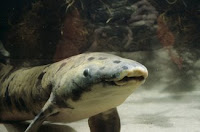Here at TFP we are rapidly approaching our annual spring sale event, This year marks our 35th anniversary. For those of you who have made the trip for past years events, you know what a fun and crazy sale it is. If you have never been to one of our anniversary sale events, then this should be your year to check it out. There are thousands of items on sale, some of them at unbelievable savings.
One of both ours, and our attendees, favorite parts of our sale events are the free seminars. This year we have a great cast of speakers for your enjoyment. We are proud to welcome back Anthony Calfo, Steven Pro and Jesse Rothacker, all of whom have been guest speakers for us in the past. This year we have a couple of new speakers, Chris Brightwell and Doug Dent.
Here is a little information about each speaker, and the topics of their seminar.
Anthony Calfo:
Aquarium Photography Tips (Sunday 2:30 p.m.)
For those of you who are not familiar with Anthony, you are in for a real treat. Anthony has an incredible amount of information and enthusiasm for the aquarium hobby, and he spends a great deal of his time sharing his knowledge and experiences with hobbyist around the world. Anthony has authored, or co-authored, several books, the most recent of which is his second edition of The Book of Coral Propagation. Anthony also publishes C the Journal, magazine for aquatic science, travel, and adventure.
Anthony’s seminar this year is about aquarium photography, in which he will share some of his tips and tricks that he has learned through the years. Aquarium photography is something that many people struggle with (myself included), this seminar will hopefully help make better photographers out of us all.
Steven Pro :
Greenhouse Coral Propagation Farm (Saturday 10:30 a.m.)
Responsible Reef Keeping (Sunday 1:30 p.m.)
Steven Pro, yes that is his real name, has over the last 15 years turned his love of the aquarium hobby into his livelihood. Steven has operated an aquarium sales and maintenance company in the Pittsburg area for many years, as well as held several interesting positions within the industry. Steven has held positions on the board of directors for the AMDA (the American Marinelife Dealers Association) and the Pittsburg Marine Aquarium Society (Hosts of MACNA XIX in 2007) For those of you who have visited the WetWebMedia.com website, you may also recognise him as a past member of the Wet Web Media crew.
Steven is performing two seminars for us this year. Saturday, Steven will chronicle his ongoing Coral Propagation greenhouse project. Over the last couple years Steven has been planning and building a Coral Farm, with the ultimate goal of large scale coral production for distribution. Steven is well into the project, and has already started to produce farmed coral.
Steven’s second seminar on Sunday will be on responsible reef keeping. This seminar will deal with issues that the worlds coral reefs are facing, and the impact that we as hobbyists have upon them. The discussion will involve focus on things that we as hobbyist can do to minimize our impact, and help ourselves at the same time.
Chris Brightwell :
Reef Aquarium Husbandry; Philosophies and Results. (Saturday 12:00 noon)
Chris Brightwell is a fellow graduate of Coastal Carolina University, and a rising name in the aquatics industry. Chris has authored numerous articles and books, including his latest book Marine Chemistry. In 2007 Chris launched a new company, Brightwell Aquatics, which offers a comprehensive line of water conditioners and supplement for Marine, Reef, and Freshwater aquariums.
Chris’s seminar will focus on the wide range of approaches and techniques that have been used in the maintenance of marine reef aquariums, and the theories behind these practices. Chris has done extensive research in the field of aquarium chemistry, both while working for Kent Marine in the past, and for product development and testing for Brightwell aquatics.
Doug Dent:
Aquarium Care Basics (Saturday 3:00 p.m.)
Doug has worked in the aquatics industry for over 30 years and is the V.P. of sales, and technical support for Ecological Laboratories, the manufacturer of Microbe Lift products. Doug is an expert in biological processes in aquatic environments.
Doug’s seminar will be about basic water chemistry, and biology, of aquariums and ponds. He will cover how the Microbe Lift products work, and how you can reduce your maintenance in both aquariums and ponds, where algae, ammonia, nitrite, nitrate come from, how to control, and how to cycle a pond or aquarium in 24 hours.
Jesse Rothaker :
Forgotten Friends Reptile Sanctuary (Saturday 1:30)
Jesse, is a herpetologist and founder of “Forgotten Friend” Reptile Sanctuary, a non-profit local reptile rescue based out of E-town. He gives hundreds of reptile shows and informational seminars to local groups and schools, and educates people on the responsibilities of being a good pet owner.
Jesse’s seminar will be a reptile show featuring all this stuff, along with a bunch of reptiles, including many Jesse and Forgotten Friend has rescued. His website is forgottenfriend.org.
I hope that this information has peeked your interest, and you will come to our anniversary sale to see this great group of speakers
Until next blog
Dave
 That Fish Blog – Aquarium Advice and Information
That Fish Blog – Aquarium Advice and Information



